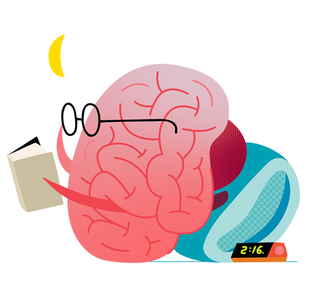
Alex Eben Meyer
How much sleep is enough? And can you get too much? When it comes to the health of your brain, Santiago Clocchiatti-Tuozzo, a postdoctoral fellow in the Department of Neurology, can offer some answers.
Clocchiatti-Tuozzo and a team of investigators in Yale’s departments of neurology, radiology, and internal medicine tapped into a subset of data collected by the UK Biobank for clues. Focusing on around 40,000 participants, ages 40 to 69, the team found that those who had more than seven but fewer than nine hours of sleep were less likely to have a brain-health profile that portends stroke or dementia around nine years later. They came to this conclusion by analyzing MRI images that showed fewer or smaller disruptions in the brain.
This Goldilocks relationship to sleep—not too much, not too little—remained a factor even when the investigators considered preexisting conditions (such as high blood pressure and diabetes) that are known to increase participants’ risks for stroke and dementia. Although Clocchiatti-Tuozzo notes that the study does not measure stroke or dementia directly, the goal was to spotlight people who might be at risk but had not yet suffered from either a stroke or dementia, and to show how habits in middle age can affect aging.
Clocchiatti-Tuozzo says he and the team found that both short sleep and long sleep are associated with a worse brain-health profile, consistent with the group’s larger hypothesis that optimal sleep is an essential part of cardiovascular health.
However, the study reports differences between the areas of the brain most affected by short sleep and long sleep. For example, short sleep was more associated with disruption of the internal capsule—a part of the brain that contains a crucial bottleneck for sensory and movement signals entering and exiting the brain. While the importance and mechanism of such a relationship is not fully explored here, the researchers hope this study and their next steps will help us understand why the right amount of sleep remains key to healthy living.
 loading
loading